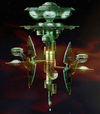Rintani Nebula
| Par'tha Expanse |
|---|
| Par'tha Geography | ||
|---|---|---|

| ||
| Spatial Phenomena | ||

|
Jenatris Cloud | |

|
Rintani Nebula | |

|
Norlian Nebula | |
| Jenatris Corridor | Siiden Passage | |
| K'tem Hyperlane | ||
| Planets and Systems | ||
| Points of Interest | ||
| Aelann Imperial Shipyards | Midway Station | |
| Jirissa Gardens | Lastelle Island | |

|
Deep Space 26 | |

|
Shemsh | |

|
Outpost Ganzera | |
| Neighboring Regions | ||
| VIR | UFP | |
| RSE | Solerian Sector | |
|
| ||
An interstellar cloud of gas and dust, the Rintani Nebula is visible throughout the Par'tha Expanse because of the emission of absorbed light, and the reflection of light, from nearby star systems. The nebula borders the coreward edge of the Expanse and contains lethally high levels of Theta radiation. Theta radiation is a hazardous form of ionizing energy. It is deleterious to humanoids, but in moderate doses, its effects are treatable.
The nebula has often been the central figure in stories and tales within the Expanse, probably because of its prominence in the heavens, and its inhospitality to living things. It has become something of an enigma. For centuries, the Rintani Nebula was speculated to be the home of the mythical planet called Darkwater. Recently, with the help of Starfleet, it was proven true, much to the public's dismay.
The edge of the Rintani Nebula is also one of the stops on the Stellar Breeze cruise. The theta radiation from the nebula reacts with a field of yrrium particles, causing them to shimmer and sparkle, creating a spectacular show for the tourists on the Stellar Breeze. The light show is only visible to passersby if they are within 100 km of the field, or pass directly through the field as the Stellar Breeze does.
Varying shades of fuschia, the Rintani Nebula is a virtual wasteland, avoided by Expanse inhabitants because of its dangers, but admired at a distance because of its beauty.